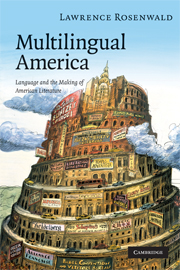Book contents
- Frontmatter
- Contents
- Preface
- Acknowledgments
- Introduction: techniques, methods, theses
- Chapter 1 Cooper's The Last of the Mohicans and the languages of America
- Chapter 2 Alfred Mercier, George W. Cable, and Louisiana French Creole
- Chapter 3 More than an echo, or, English in Yiddish in America
- Chapter 4 “New language fun,” or, on translating multilingual American texts
- Chapter 5 Towards a history of multilingual American literature
- Bibliography
- Index
Preface
Published online by Cambridge University Press: 22 September 2009
- Frontmatter
- Contents
- Preface
- Acknowledgments
- Introduction: techniques, methods, theses
- Chapter 1 Cooper's The Last of the Mohicans and the languages of America
- Chapter 2 Alfred Mercier, George W. Cable, and Louisiana French Creole
- Chapter 3 More than an echo, or, English in Yiddish in America
- Chapter 4 “New language fun,” or, on translating multilingual American texts
- Chapter 5 Towards a history of multilingual American literature
- Bibliography
- Index
Summary
This book is about how writers of American literature, both in English and in other languages, have represented encounters in America between communities speaking different languages, in particular those between Europeans and Native Americans, those between slaveholders and African slaves, and those between immigrants and Americans.
Most definitions, even the simplest, have hidden complexities and polemical points to make; mine has three. The first concerns the word “American.” It is an imprecise term; as used above, it implies wrongly that America is co-extensive with the United States. But “United States” is also an imprecise term, especially when it is used to refer to events in parts of North America that became part of the United States only later. There is no perfect term here; I use the imperfect ones as seems appropriate, and “American” more often.
The second concerns the word “encounters.” A fair amount of recent sociolinguistic work argues against using that term (or terms similar to it, e.g., “contacts”), and in favor of using the term “conflict.” “The debate,” writes Henri Boyer, “between the advocates of a sociolinguistics that describes language contacts and those of a sociolinguistics that investigates language conflicts, whether latent or declared, is still alive.” Those who prefer “conflicts” have much going for them; too often terms like “encounter” or “contact” have been used to obscure invasion, oppression, slavery, all the horrific instances of what Louis-Jean Calvet has called “glottophagie,” the eating up of languages.
- Type
- Chapter
- Information
- Multilingual AmericaLanguage and the Making of American Literature, pp. ix - xxPublisher: Cambridge University PressPrint publication year: 2008

